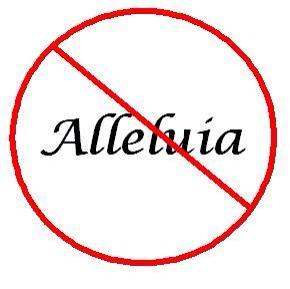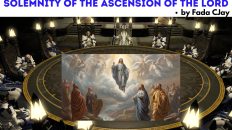For some time now, I had been receiving similar messages from different persons, requesting to explain the reason why the Catholic Church omits ALLELUIA during Lent; in other words, why we do not sing or say alleluia in Lent. I hereby present this piece in order to respond to the question. However, I apologize for the delay in response due to the demands of studies. Let us now look at the context in which alleluia was used and the sentiment that flows with it.
The concept “Alleluia” or “hallelujah” springs from Hebrew, signifying “Praise ye YAH” (Yahweh). The Alleluia in Revelation 19 is utilized in heaven, where a great multitude has gathered before the throne in the immediate presence of God Himself; the marriage feast of the Lamb (Christ) and his bride (the Church). I nostalgically remember those days in Opere, Ibadan (Nigeria), when we sang this very hymn every Sunday during the liturgy of the hours at Vespers – evening prayers (outside lent). The hymn tells of the reign of God, his enemies overthrown, and the triumph of the gospel. Indeed, it is a victorious celebration; all heaven renders praise – a song of thanksgivings. The sound of the outpouring of praise and worship is so overwhelming that the apostle John can only describe it as “like a great multitude, like the roar of rushing waters and like loud peals of thunder” (verse 6). It is, therefore, a term of great joy. Therefore, our use of the Alleluia during Mass is a way of participating in the angels’ worship. It is also a reminder that the Kingdom of Heaven is already established on earth, in the form of the Church, and that our participation in Mass is a participation in Heaven.
During Lent, however, our focus is on the coming Kingdom, not on the Kingdom having come. The readings in the Masses for Lent and in the Liturgy of the Hours (the official daily prayer of the Catholic Church) focus heavily on the spiritual journey of Old Testament Israel toward the coming of Christ, and the salvation of mankind in His death on Good Friday and His Resurrection on Easter Sunday. We, too, are on a spiritual journey, toward the Second Coming and our future life in Heaven. In order to emphasize the penitential nature of that journey. For this reason, the Church, during Lent, removes the Alleluia from the Mass in order that we might flow with the sentiment of the season of Lent and later sing it at Eastertide (where it makes more meaning), then subsequently in other seasons. Therefore, in Lent, we no longer sing with the choirs of angels; instead, we acknowledge our sins and practice repentance so that one day we may again have the privilege of worshiping God as the angels do.
The Alleluia returns at Easter. Put differently, on Easter Sunday—or, rather, at the Easter Vigil (on Holy Saturday night), the priest chants a triple Alleluia before the gospel is read, and everyone present responds with a triple Alleluia. The Lord is risen; the Kingdom has come; our joy is complete; and, in concert with the angels and saints, we greet the risen Lord with shouts of “Alleluia!”
If alleluia is not to be said at Lent, what then should we say or sing before the Gospel acclamation at Mass? I guess many of you might say it is “Glory and Praise to You, Lord Jesus”; however, let’s see what the Church’s document has to say about this. In this regards, the General Instruction of the Roman Missal (GIRM), Chapter II, Section II, Part B, Paragraph 62b succinctly states: “During Lent, in place of the Alleluia, the verse before the Gospel is sung, as indicated in the Lectionary. It is also permissible to sing another psalm or tract, as found in the Graduale.”
So, in fact, the GIRM indicates that the only thing that is sung before the Gospel is the prescribed verse (which can be found in a missal or missalette, as well as in the official Lectionary that the priest uses) or another psalm verse (a biblical passage) found in the Graduale.
In case you’re wondering why the “Glory and praise…” is being used, kindly note that the “Glory and Praise to You, Lord Jesus Christ” is drawn from a biblical passage (cf. Philippians 1:11) and found in the Graduale. Therefore, while it is not prescribed as the only possible replacement for the Alleluia, other gospel verses found in the missal/official lectionary or a psalm verse could equally be used.




